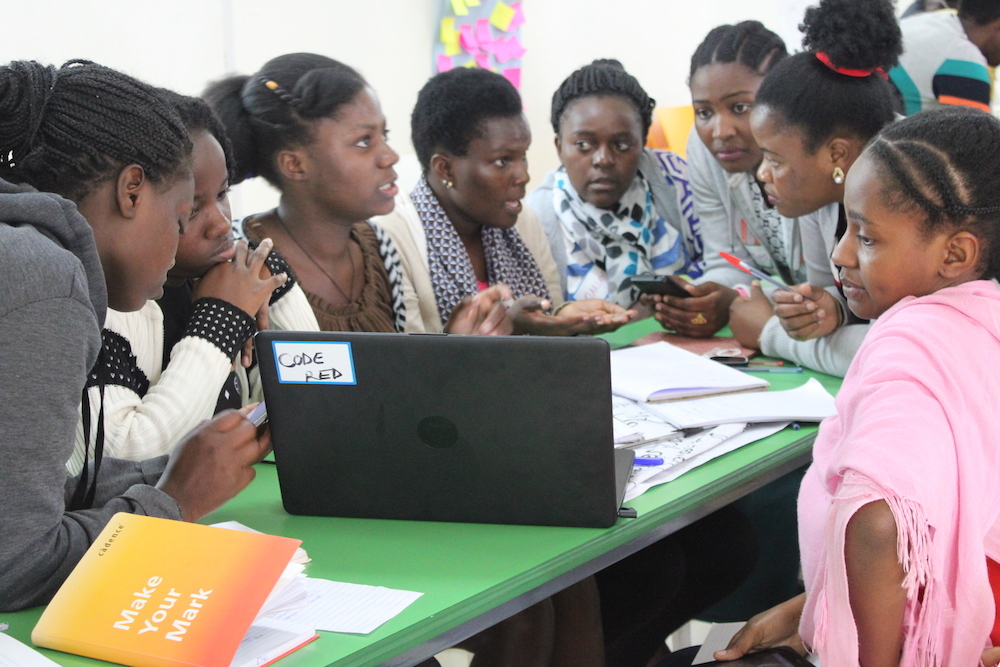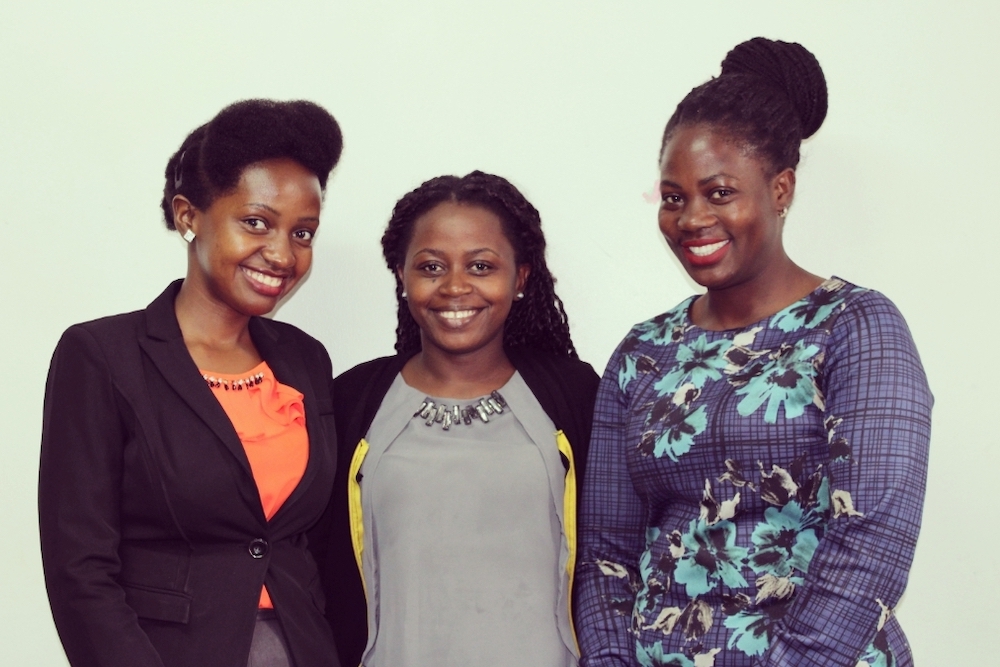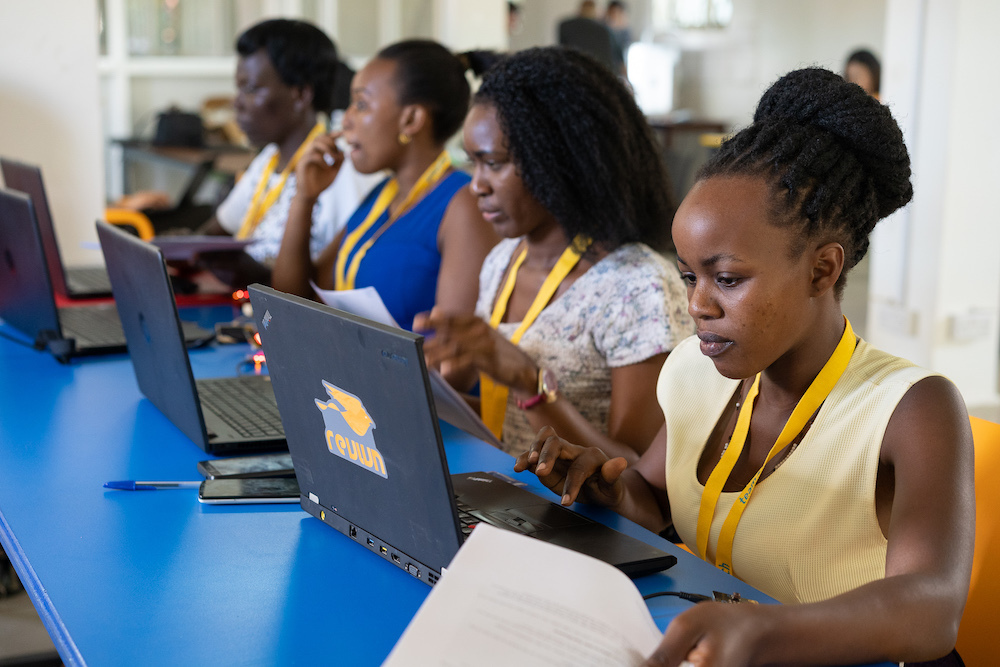
Covid-19 response delivers health advice and home learning to girls and young women in Uganda

Girls' education, Technology and education
Theirworld partners with Women in Technology Uganda to provide digital, entrepreneurship, leadership and life skills in vulnerable communities.
At first glance, Uganda seems to have coped with the coronavirus pandemic better than most countries. Two deaths and just over 1,100 confirmed cases in a nation of more than 40 million people.
But scratch under the top-line statistics and you’ll find evidence of growing hardship, loss and fear – especially for girls and women. Uganda’s economy was devastated during lockdown and the World Bank says the effects will throw more than three million extra people into poverty.
Schools have been closed since early March for 15 million students. The East African nation has taken the first tentative steps out of its Covid-19 measures but there is uncertainty about when classrooms will be able to reopen safely. That has led to fears of increased numbers of girls dropping out of education.
“When girls are in school, they are busy and their minds are doing something. But this pandemic has delayed the girls studying and acquiring knowledge,” said Becky Iradukunda, Programme Co-ordinator at Women in Technology Uganda (WITU), an organisation which helps to train the next generation of female leaders.
“Now we have girls saying they are facing challenges in terms of early marriage. We have communities where parents are very traditional and once a girl has grown to age, they think about marrying her off and getting a dowry in exchange.”
Theirworld has partnered with WITU since 2016 on programmes to provide digital skills, entrepreneurship, leadership and life skills to girls and women. That includes Code Clubs for Girls and the Skills for their Future programmes, which deliver digital literacy content for 300 students across three schools.
Like many other public places, schools remain closed. But WITU has been working harder than ever to help girls and women through the health crisis – reinforcing messages about handwashing, face masks and other safety advice.
Its short-term Covid-19 response – supported by funding from Theirworld and made possible by the players of the People’s Postcode Lottery UK – includes:
- Providing alternative access to online and printed educational materials to 300 primary school learners in rural communities through door-to-door outreach and giving them teachers’ guidance and support while schools are closed
- Giving digital training to teachers
- Supporting school dropouts with online and in-person classes that focus on how to stay safe during Covid-19 and equips them with key entrepreneurship skills
WITU has provided learning materials for 300 students who are at home. That support is vital to ensure children don’t drop out of education.
“With the schools closed, the children are all at home. Some parents who could afford it could get online learning materials. Some good schools went an extra mile to provide content for their students,” said WITU Programme Co-ordinator Esther Nansubuga.
“But for vulnerable students and parents, the kids have been doing nothing and just playing or watching movies the whole day. They want to interact with a teacher and with their friends.

From the WITU team (left to right) – Becky Iradukunda, Leticia Nakitende and Esther Nansubuga
“Most of the parents from vulnerable communities did not go to school themselves – so they cannot help the kids with their learning.
“The government has been providing some learning materials but they can’t reach everyone. Because some parents are really broke, they cannot afford internet. Some are also saying the government content is very complicated and hard to understand.
“Thanks to Theirworld, WITU has been able to give learning materials to more kids. This is helping to make them busy. But we are looking at school dropout rates increasing when they reopen.”
The learning materials distributed by WITU were prepared by the ministry of education, said Finance Co-ordinator Leticia Nakitende. She added: “We have a network of schools that we work with. They supplied the materials, which are printed booklets with questions and the kids put in the answers.”
Before the pandemic, many vulnerable families struggled to pay school fees and the cost of books and uniforms.
That will be an even bigger challenge when children return to classrooms, according to Barbara Birungi, WITU’s Founder and Director. She said: “Most of the parents we see have lost their jobs, so they will not be able to support their children through school. They will not even be able to afford the costs, so many children will drop out of school.
Our school classes can have 100 children - on each desk you will see three people, so I don’t see social distancing happening. Leticia Nakitende, WITU Finance Co-ordinator
“WITU has a programme for school dropouts so we can teach them to learn a skill.”
When schools do reopen, it will be almost impossible to impose the social distancing measures seen in some countries.
“We think they will start to open in August,” said Leticia. “But our school classes can have 100 children – on each desk you will see three people, so I don’t see social distancing happening. It’s hard to tell how schools will work around this.”
The psychological effects of lockdown and missing out on school are going to be felt for some time.
WITU says the stress on parents has led to an increase in children being disciplined – and this in turn has resulted in some of them running away from home and living on the streets.
“With everyone at home, the kids do not have space to deal with their problems so it is a lot emotionally for the kids,” said Becky.

The programme for girls and young women who dropped out of school teaches them new skills (WITU)
“There will be a lot of psychological issues for the children getting back to a routine of getting up for school and doing homework.
“The future of education is uncertain. We do know that teachers will have more work – not just in terms of teaching but in changing kids’ mindsets. Working to bring them back into the class is going to be something extra for them.”
But everyone at WITU is determined to continue helping girls and women to fulfil their potential.
“Our programmes have not stopped. But since the lockdown we had to think how to make things work,” said Barbara.
“We had to make sure we engage people while they are at home. It affected our computer training because most of the ladies don’t have computers at home. But the life skills training went on.
“There will be challenges and there will be solutions.”
More news

